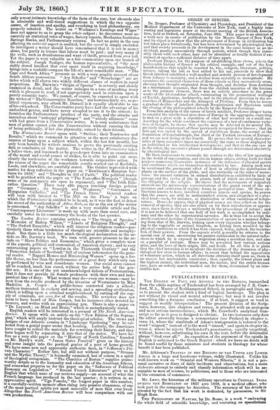ORIGIN OF SPECIES.
Dr. Draper, Professor of Chemistry and Physiology, and President of the Medical Department of the University of New York, read a highly inte- resting and ingenious paper at the recent meeting of the British Associa- tion, held at Oxford, on Saturday, June 30th. This paper is an abstract of a work now in course of publication by the Messrs..Harper of New York, and its object is to show that the advancement of Europe in civilization has
not taken place fortuitously, but has been determined by physiological law, and that society proceeds in its development in the same manner as an in- dividual, passing successively through periods, which though they insen- sibly blend with each other, may yet be identified as totally distinct if ex- amined at epochs a sufficient distance of time apart.
Professor Draper, for the purpose of establishing these views, selects the philosophic history of Greece as his critical example, and out of the four manifestations that might be resorted to, viz., religion, literature, politics, science, taking the last as best suited to his use, proceeds to show that Greek intellect exhibited a well-marked and orderly process of development from infancy to maturity, and a decline from maturity to decrepitude. He examines the essential characters of these schools as they successively arose, showing how thought originated from thought, and doctrine from doctrine in a determinate sequence, that from the childish inquiries of the Ionians as to the primary element, there was an orderly procedure to the great works of the Alexandrian school, culminating in the geometrical writings of Euclid, Apollonius, Archimedes, and in the physical direction in the re- searches of Hipparchus and the Almagest of Ptolemy. From this he traces a gradual decline of intellect through Neoplatonism and Mysticism until the closing of the philosophical schools by the Emperor Justinian. From this analysis of the career of Greek intellect, Professor Draper turns
to consider the intellectual procedure of Europe in the aggregate, expecting to find on a great scale a repetition of what had occurred on a small one. Asserting for the whole continent the existence of a law of continuous varia- tion of thought, he shows that epochs may be detected in its mental life, precisely the counterpart of those previously recognized for Greece ; that its first age was ended by the spread of republican Rome, the second at the foundation of Constantinople, the third at the Turkish invasion of Europe ; and we are now living at the fourth. He proves that the mental character- istics of these successive times are essentially the same as those displayed by an individual in his intellectual development; and that iu the one case as in the other, the successive phases pasaed through are determined absolutely by physiological law.
He then endeavours to reconcile his readers to the idea of law operating in the world of organization, and also in human affairs, setting forth for that purpose numerous illustrative instances of the influence of physical agents and conditions which are themselves determined by law. Among such may be mentioned the paramount effect of heat in effecting the distribution of plants on the surface of the globe, and also vertically on the aides of moun- tains : the annual variation in animal distribution as exhibited by birds of passage and the cycles of life in plants, both of which are determined by the obliquity of the ecliptic. He shows that the movements of migratory animals arc the microscopic representations of the grand event of the ap- pearance and extinction of organic forms in geological time. Of these ex- tinctions known to have involved countless genera and species, he proves that the causes are still iu undiminished action, and altogether of a phy- sical kind—such, for instance, as diminution or other variations of tempe- rature. Hence he argues, that if physical causes are thus relied on for the removal of species, they are also relied on for their introduction or appear- ance, since there is always a uniformity in the proceedings of nature ; and it is not to be believed that one half of her work is accomplished by ordi- nary and the other by supernatural agencies. Ho is thus led to accept the much-contested doctrine of the transmutation of species in a manner differ- ing from that of Mr. Darwin, looking upon every organism whether belong- ing to the vegetable or animal kingdom, as having been moulded by the physical conditions to which it has been exposed, being, indeed, the incarna- tion of their powers. From the organic world gLnerally he returns to the special case of man, considering his passive submission to the natural influ- ences to which he is exposed in migration along a meridian line, and also on a parallel of latitude. Hence may be perceived how various nations arise, and the laws of their origin, life, and death. In all this it is plain that the chief intention is to inculcate the doctriue of the dominion of phy- siological law even in human affairs; to assert that behind the appearance of voluntary action, which in all directions obtrudes itself upon us, there is an unseen but unavoidable constraint ; that, equally, the lowest plant and the highest animal, the individual man, the nation, and the entire human race, have an orderly marclr marked out for them, determined by an irre- sistible law.


























 Previous page
Previous page